|
|
|
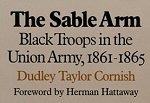 The Sable Arm: Black Troops in the Union Army, 1861-1865 The first work to fully chronicle the remarkable story of the nearly 180,000 black troops who served in the Union army. This work paved the way for the exploration of the black military experience in other wars. This edition, with a new foreword by Herman Hattaway and bibliographical essay by the author, makes available once again a pioneering work that will be especially useful for scholars and students |
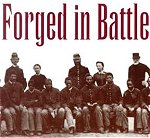 Forged in Battle: The Civil War Alliance of Black Soldiers and White Officers This historical exploration denotes the uneasy alliance between black soldiers and white officers who, divided by racial tension and ideology, were united by the trials and bonds of the war they fought side by side |
Kindle Available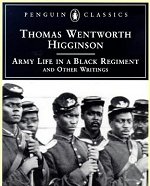 Army Life in a Black Regiment: and Other Writings In 1862, Thomas Wentworth Higginson was commissioned as a colonel to head the first regiment of emancipated slaves. A Civil War memoir written by an abolitionist, this text is the stirring history of the first regiment of emancipated slaves formed to fight in the Civil War |
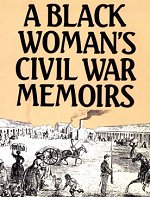 A Black Woman's Civil War Memoirs: Reminiscences of My Life in Camp With the 33rd U.S. Colored Troops, Late 1st South Carolina Volunteers Taylor was born a slave in 1848 on an island off the coast of Georgia. She gained her freedom and worked as a laundress for an African-American Union regiment during the war. She offers fascinating details about her life with the troops |
Kindle Available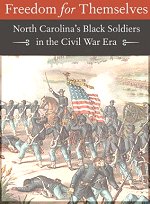 Freedom for Themselves: North Carolina's Black Soldiers in the Civil War Era The processes by which black men enlisted and were trained, the history of each regiment, the lives of the soldiers' families during the war, and the experiences of the colored veterans and their families living in an ex-Confederate state |
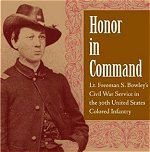 Honor in Command: Lt. Freeman S. Bowley's Civil War Service in the 30th United States Colored Infantry A young white officer who served as a lieutenant in a regiment of U.S. Colored Troops in the Union Army, is the work of a superb storyteller who describes how his Civil War experiences transformed him from a callow youth into an honorable man. Describing in detail his relationship with the men in his company, Bowley extols the role of black soldiers and their officers in the Union victory. |
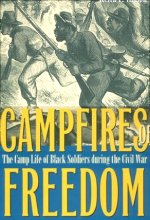 Campfires of Freedom: The Camp Life of Black Soldiers During the Civil War African-Americans - both freemen and ex-slaves - enlisted for a variety of reasons, from patriotism to sheer poverty. Like many of their white counterparts, they attributed theological significance to the war |
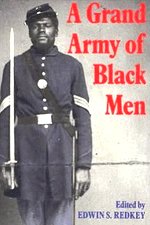 A Grand Army of Black Men: Letters from African-American Soldiers in the Union Army 1861-1865 Almost 200,000 African-American soldiers fought for the Union in the Civil War. Although most were illiterate ex-slaves, several thousand were well educated, free black men from the northern states |
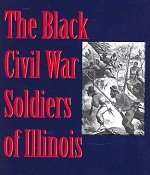 The Black Civil War Soldiers of Illinois: The Story of the Twenty-Ninth U.S. Colored Infantry Study in the lives of black recruits in the Civil War era, and a journey into the hinterlands of an American racial pathos. Throughout this study, Miller explores in detail the biographies of individual soldiers, revealing their often convoluted histories |
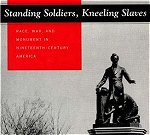 Standing Soldiers, Kneeling Slaves The United States of America originated as a slave society, holding millions of Africans and their descendants in bondage, and remained so until a civil war took the lives of a half million soldiers, some once slaves themselves. |
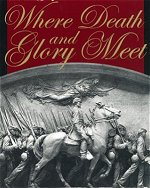 Where Death and Glory Meet: Colonel Robert Gould Shaw and the 54th Massachusetts Infantry July 18, 1863, the African American soldiers of the Fifty-Fourth Massachusetts Infantry led a courageous but ill-fated charge on Fort Wagner, a key bastion guarding Charleston harbor. Confederate defenders killed, wounded, or made prisoners of half the regiment. Only hours later, the body of Colonel Robert Gould Shaw, the regiment's white commander, was thrown into a mass grave with those of twenty of his men. |
Kindle Available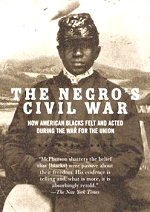 The Negro's Civil War: How American Blacks Felt and Acted During the War for the Union In this classic study, Pulitzer Prize-winning author James M. McPherson deftly narrates the experience of blacks--former slaves and soldiers, preachers, visionaries, doctors, intellectuals, and common people--during the Civil War |
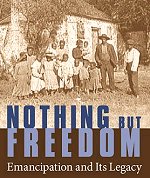 Nothing but Freedom: Emancipation and Its Legacy Insights into the relatively neglected debates over fencing laws and hunting and fishing rights in the post emancipation South, and into the solidarity of the low-country black community |
Kindle Available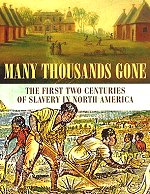 Many Thousands Gone: The First Two Centuries of Slavery in North America The evolution of black society from the first arrivals in the early seventeenth century through the Revolution |
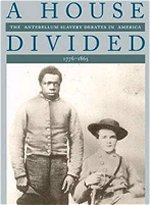 A House Divided: The Antebellum Slavery Debates in America, 1776-1865 An excellent overview of the antebellum slavery debate and its key issues and participants. The most important abolitionist and proslavery documents written in the United States between the American Revolution and the Civil War |
 Strike the Blow for Freedom: The 6th United States Colored Infantry in the Civil War The recruitment, training, battles and finally the mustering out of the 6th. The 6th shared some of the same influences that shaped the formation of many military units of that time |
Kindle Available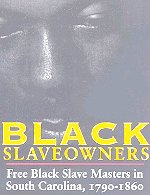 Black Slaveowners: Free Black Slave Masters in South Carolina, 1790-1860 An analysis of all aspects and particularly of the commercialism of black slaveowning debunks the myth that black slaveholding was a benevolent institution based on kinship, and explains the transition of black masters from slavery to paid labor. |
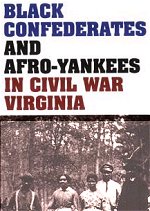 Black Confederates and Afro-Yankees in Civil War Virginia African American life in Virginia, both slave and free, during the civil war, from soldiers who fought in the Confederate and Union armies to those who acted as spies |
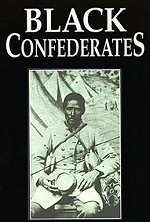 Black Confederates It was illegal for Blacks to carry arms until March of 1865, and numerous Confederate Government documents attest to the illegality of using slaves and free Blacks in that capacity |
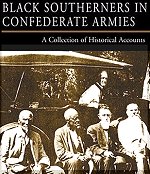 Black Southerners in Confederate Armies Official records, newspaper articles, and veterans' accounts to tell the stories of the Black Confederates. This well researched collection is a contribution to the discussion about the numbers of black Southerners involved and their significant history. |
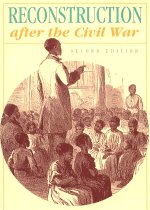 Reconstruction after the Civil War Chicago History of US Civilization Praised for cutting through the controversial scholarship and popular myths of the time to provide an accurate account of the role of former slaves during this period in American history |
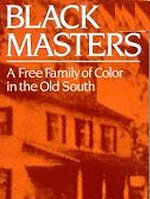 Black Masters: A Free Family of Color in the Old South This book focuses on biracial persons of white/black ancestry. Persons who tend to be dark complected often consider themselves to be black and because the laws of antebellum South Carolina clearly differentiated between whites and free persons who did not fall into the white category |
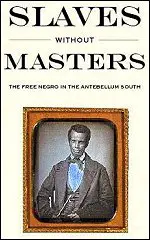 Slaves without Masters The Free Negro in the Antebellum South The moving story of the quarter of a million free black men and women who lived in the South before the Civil War. portraying their struggle for community, economic independence, and education within an oppressive society. |
Kindle Available Black Slaveowners: Free Black Slave Masters in South Carolina, 1790-1860 An analysis of all aspects and particularly of the commercialism of black slaveowning debunks the myth that black slaveholding was a benevolent institution based on kinship, and explains the transition of black masters from slavery to paid labor. |
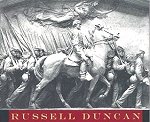 Where Death and Glory Meet: Colonel Robert Gould Shaw and the 54th Massachusetts Infantry The history of how our culture determines manhood. Although a rather detached supporter of abolition, Shaw was skeptical about the fighting abilities of freedmen, and initially declined the command. When he did accept, he was aware that the eyes of the nation were on his regiment, and his training of them was relentless. The 54th measured up by proving itself in battle |
Kindle Available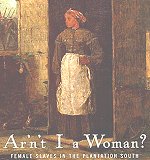 Ar'n't I a Woman?: Female Slaves in the Plantation South Firsthand accounts of Black "sisters of the spirit" is the only way to truly gain a feel for what they endured and the larger cultural evils. |
Kindle Available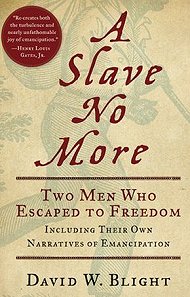 A Slave No More: Two Men Who Escaped to Freedom, Including Their Own Narratives of Emancipation A mere handful are first-person accounts by slaves who ran away and freed themselves. Now two newly uncovered narratives, and the biographies of the men who wrote them, join that exclusive group with the publication |
 Black Confederates and Afro-Yankees in Civil War Virginia African American life in Virginia, both slave and free, during the civil war, from soldiers who fought in the Confederate and Union armies to those who acted as spies |
Kindle Available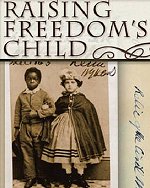 Raising Freedom's Child: Black Children and Visions of the Future After Slavery Previously untapped documents and period photographs casts a dazzling, fresh light on the way that abolitionists, educators, missionaries, planters, politicians, and free children of color envisioned the status of African Americans after emancipation |
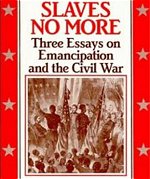 Slaves No More: Three Essays on Emancipation and the Civil War The first essay traces the destruction of slavery by discussing the shift from a war for the Union to a war against slavery The second essay examines the evolution of freedom in occupied areas of the lower and upper South. The third essay demonstrates how the enlistment and military service of nearly 200,000 slaves hastened the transformation of the war into a struggle for universal liberty |
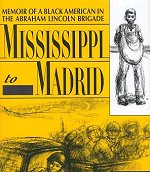 Mississippi to Madrid: Memoir of a Black American in the Abraham Lincoln Brigade From his birth to a share cropper family in Mississippi to the unrest in Chicago and New York during the depression, James Yates's experience with labor protest and union organizing shaped his vision of freedom and led to his decision to fight against fascism in the Spanish Civil War |
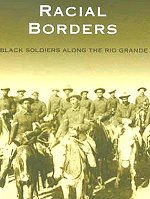 Black Soldiers Along the Rio Grande With the publication of Racial Borders Leiker has established himself as a leading authority on African American military history. This is a fine example of new social history and should be widely read.—Journal of America’s Military Past |
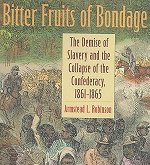 Bitter Fruits Of Bondage: The Demise Of Slavery And The Collapse Of The Confederacy, 1861-1865 The process of social change initiated during the birth of Confederate nationalism undermined the social and cultural foundations of the southern way of life built on slavery, igniting class conflict that ultimately sapped white southerners of the will to go on. |
 A Stranger And a Sojourner: Peter Caulder, Free Black Frontiersman in Antebellum Arkansas An illiterate free black man, defied all generalizations about race as he served with distinction as a marksman in the U.S. Army during the War of 1812, repeatedly crossed the color line, and became an Arkansas yeoman farmer, thriving and respected by white neighbors until he fell victim of new discriminatory legislation on the eve of the Civil War |
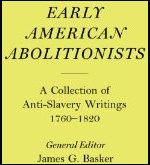 Early American Abolitionists: A Collection of Anti-slavery Writings, 1760-1820 This compilation reprints fifteen anti-slavery texts that, almost without exception, have been out of print for nearly two centuries. The pamphlets, poems, letters, and other documents by anti-slavery writers-men and women, black and white-demonstrate that abolitionists were active in the early years of the American republic. The book's texts are reprinted with short introductions written by 12 Gilder Lehrman history scholars. |
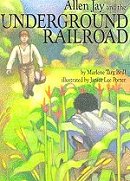 Allen Jay and the Underground Railroad Allen Jay and the Underground Railroad is the retelling of a man's recollections of his first experience helping an escaped slave. The book brings the underground railroad down to the level primary students can comprehend. This book makes for wonderful discussions regarding overcoming one's fears, going against the norm and doing what you believe to be morally correct. |
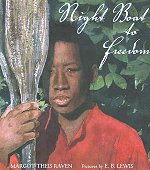 Night Boat To Freedom Night Boat to Freedom is a wonderful story about the Underground Railroad, as told from the point of view of two "ordinary" people who made it possible. Beyond that, it is a story about dignity and courage, and a devotion to the ideal of freedom. |
Kindle Available A Yankee Girl at Fort Sumter Tale of a girl and her family from Boston living in Charleston, SC during the months leading up to the beginning of the Civil War by the attack on Fort Sumter. The reader senses the inhunanity of slavery through Sylvia's experiences. |
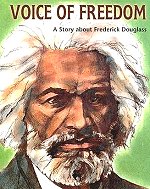 Voice of Freedom: A Story About Frederick Douglass Interesting for both children and adults, this book does much to evoke the strong-minded, highly-principled person who inspired so many others |
 Turn Homeward, Hannalee During the closing days of the Civil War, plucky 12-year-old Hannalee Reed, sent north to work in a Yankee mill, struggles to return to the family she left behind in war-torn Georgia. "A fast-moving novel based upon an actual historical incident with a spunky heroine and fine historical detail."--School Library Journal. |
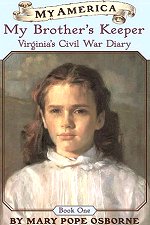 My Brothers Keeper Virginia Dickens is angry. Her father and brother Jed have left her behind while they go off to Uncle Jack's farm to help him hide his horses from Confederate raiders. It's the summer of 1863 and Pa and Jed believe 9-year-old Virginia will be out of harm's way in the sleepy little town of Gettysburg, Pennsylvania. |
Kindle Available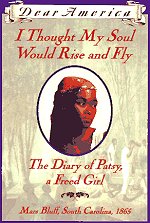 I Thought My Soul Would Rise and Fly: The Diary of Patsy, a Freed Girl, Mars Bluff, South Carolina 1865 Not only is 12-year-old Patsy a slave, but she's also one of the least important slaves, since she stutters and walks with a limp. So when the war ends and she's given her freedom, Patsy is naturally curious and afraid of what her future will hold. |
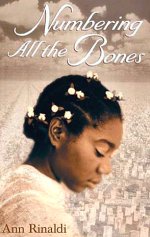 Numbering The Bones The Civil War is at an end, but for thirteen-year-old Eulinda, it is no time to rejoice. Her younger brother Zeke was sold away, her older brother Neddy joined the Northern war effort,. With the help of Clara Barton, the eventual founder of the Red Cross, Eulinda must find a way to let go of the skeletons from her past. |
| Gettysburg Campaign Book Titles Company Book Titles Colored Troops |
Civil War Generals Book Titles Young Reader Books |
|
American Civil War Exhibits
Civil War Timeline
Documents of the Civil War
Civil War Naval Resources
Civil War Summary
| Search AmericanCivilWar.com |
| Enter the keywords you are looking for and the site will be searched and all occurrences of your request will be displayed. You can also enter a date format, April 19,1862 or September 1864. |